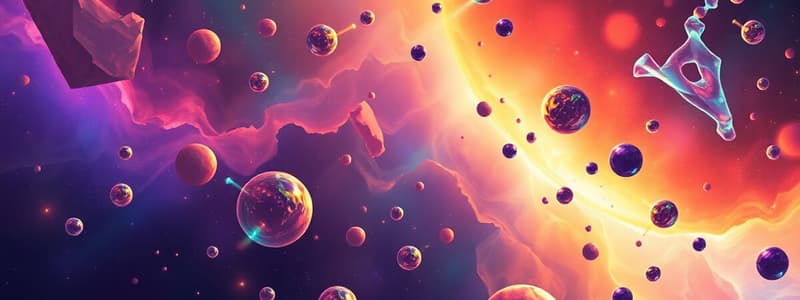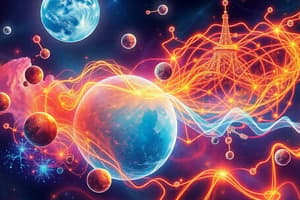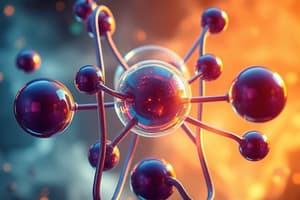Podcast
Questions and Answers
What property distinguishes liquids from gases?
What property distinguishes liquids from gases?
- Liquids have no definite volume.
- Liquids have a definite volume. (correct)
- Liquids have a fixed shape.
- Liquids can be compressed easily.
What happens to the particles in a liquid when it is heated?
What happens to the particles in a liquid when it is heated?
- Their speed remains constant.
- They change into a gas state.
- They move slower and become more tightly packed.
- They gain energy and move faster. (correct)
Which state of matter has particles that are widely separated and can be compressed?
Which state of matter has particles that are widely separated and can be compressed?
- Liquid
- Gas (correct)
- Solid
- Plasma
What type of variable is affected by the independent variable in an experiment?
What type of variable is affected by the independent variable in an experiment?
Which statement correctly describes a controlled variable?
Which statement correctly describes a controlled variable?
What is the smallest unit of matter?
What is the smallest unit of matter?
How are compounds formed?
How are compounds formed?
Which statement is true regarding mass?
Which statement is true regarding mass?
What is the definition of volume?
What is the definition of volume?
What happens to solid particles when they are heated?
What happens to solid particles when they are heated?
How does the behavior of gas particles differ from that of solid particles?
How does the behavior of gas particles differ from that of solid particles?
In which of the following states of matter do particles occupy fixed positions?
In which of the following states of matter do particles occupy fixed positions?
When a liquid is poured into a glass, which of the following occurs?
When a liquid is poured into a glass, which of the following occurs?
Flashcards are hidden until you start studying
Study Notes
Atoms and Matter
- An atom is the smallest unit of matter, not the biggest or made of different elements.
- Compounds consist of different types of atoms that are chemically combined.
Properties of Matter
- Matter occupies space and has mass, distinguishing it from non-matter.
- Mass is a measurement of the amount of matter in an object, remaining constant regardless of location, measured in grams (g), kilograms (kg), or milligrams (mg).
- Volume measures the space an object occupies; its greater mass correlates with a larger volume.
Phases of Matter
- Matter exists in three phases: solids, liquids, and gases, differentiated by particle behavior.
- In solids, particles are tightly packed in fixed positions, maintaining a definite shape and unable to be compressed.
- Liquids have a definite volume but no fixed shape, adapting to the shape of their container while maintaining volume.
- Gas has neither a definite volume nor shape; its particles are widely separated and can be compressed.
Particle Behavior
- Particles in solids vibrate but do not move freely.
- Liquid particles move more rapidly when heated, resulting in increased energy and speed.
- Gas particles have weak forces between them, allowing for expansion and compression.
Variables in Experiments
- Independent variables are manipulated to observe effects.
- Dependent variables change in response to independent variables.
- Controlled variables are consistent factors to ensure the validity of an experiment.
Studying That Suits You
Use AI to generate personalized quizzes and flashcards to suit your learning preferences.




